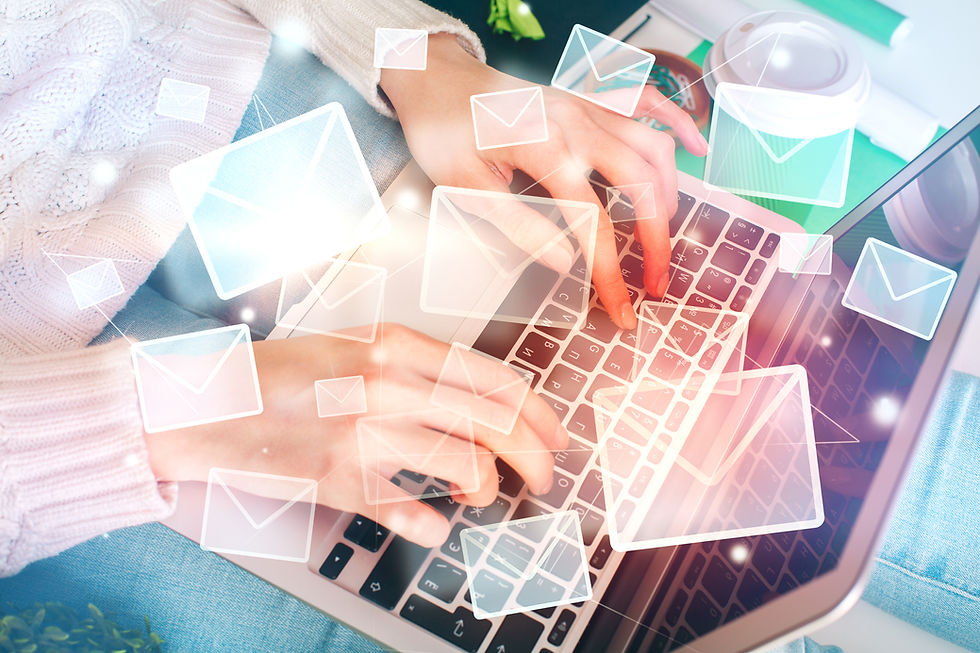How to delegate your e-mails to an independent assistant?
- Meli Steinberg

- May 4, 2021
- 3 min read
Updated: Jul 18, 2021
An independent assistant can reduce the burden of e-mail management in a way that automated systems cannot! She can sort through your incoming e-mails or even answer some messages.

The most effective configuration combines human assistance with a set of email rules and filters, so that your independent assistant doesn't waste time deleting unwanted messages or filing missives you don't need. Considering that a large part of your workload is likely to be sifting through incoming messages, responding to appointment requests and ensuring that your priority emails are answered promptly, requesting assistance with this sorting is actually one of the best uses of administrative support.
The decision to delegate
If you're worried about delegating email management, you don't have to give full access to your email to get significant help managing your inbox. How much of your email you delegate depends not only on the support you have, but also on your working style, your relationship with your freelance assistant and your office culture.
Setting up the delegation
Once you have determined who will provide you with email support and how much you will trust them, you need to set up a system that will allow you to manage your inbox collaboratively. This includes both the technical set-up that will allow you to share emails and setting clear expectations about how you and your freelance assistant will work together.
Using delegation services: since sharing your password is a risky proposition, it is a good idea to share access to your email using a delegation service such as those provided by Gmail or Outlook. Delegation allows another person to access your email using their own password; you can revoke this access at any time. Outlook even allows you to customise your delegation settings to limit what your assistant can see.
Creating a second email address: If you are concerned about giving an independent assistant direct access to your email, creating a second email address can be a useful strategy.
Specify your response protocol: determine whether your independent assistant will respond to emails on your behalf or by forwarding them to an account in her name and responding ("X forwarded your email and asked me to find a time to meet with you").
Write sample replies: especially if you have a new freelance assistant or if you are trying to delegate emails for the first time, write some sample replies that your freelance assistant can use as a basis for her own messages. This is especially important if you are allowing your freelance to send messages on your behalf. While you're at it, create some standard responses that you can use yourself when forwarding an email to your independent assistant ("My PA Jane Doe, copied on this email, can remind you of a meeting time").
Making the most of delegation
Once you have set up your delegation system, there are a few practices and tools that make collaborative email management easier:
Timing: agree when and how often your freelance assistant will review your inbox. If you have access to daily support, your independent assistant can review your messages first thing in the morning, and perhaps at other agreed times during the day; you will look at your inbox after your freelancer has moved any unnecessary messages into one or more folders which she will review herself. If your independent assistant only provides a few hours of support per week, forward the messages you want her to deal with, or put them in a designated folder - just make sure you reply to your callers, telling them that you or your independent assistant will get back to them in a few days.
Flags and labels: if your independent assistant has direct access to your inbox, ask her to flag any emails that you need to read or deal with personally, or conversely, tell her that you will flag any emails that you want her to deal with. This will work best if you use a system of mail folders, labels or tags to categorise emails of different types: create a category or tag ("Assistant") that you can apply to any message that your independent assistant needs to deal with, and another ("To Read") for any message that you need to read yourself, and make sure that you apply these tags as necessary when one of you is going through the inbox.
Forwarding: Set up rules for forwarding certain types of messages to your independent assistant, such as meeting requests or invoices. You can also set up a rule that forwards any marked/starred message, or any message with a specific label; this way you can quickly mark any message you want to forward, without having to do it manually.
Adapted from this article




Kommentare